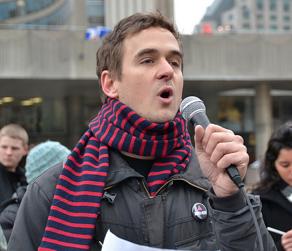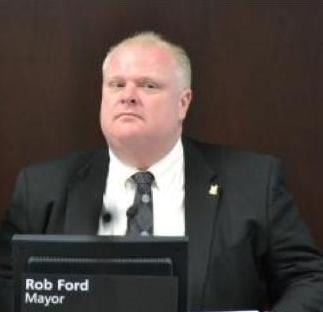
Alex McClelland protesting Mayor Rob Ford's first day in office. Credit: Andrea Houston

Mayor Rob Ford. Credit: Andrea Houston
The latest KPMG Core Services Review report suggests deep cuts will be made to the Community Partnership Investment Program (CPIP), totalling $43,583,706. And Ward 27 Councillor Kristyn Wong-Tam is calling on community members to depute at a July 28 executive committe in a bid to guard against the cuts.
In 2010 CPIP issued grants to community groups like the AIDS Committee of Toronto, Pride Toronto, the 519 Church Street Community Centre, Casey House and Buddies in Bad Times Theatre, to name a few from the list of 864 organizations.
CPIP funds 42 AIDS prevention projects, 38 community drug prevention projects, 465 school communities (representing 685 student nutrition programs) as well as community festivals and special events. The KPMG report states, “potential savings are high” but “programs funded through these services would end. Care for the homeless may degrade. Student nutrition could be compromised through the elimination of this service.”
The consultants at KPMG have carved through each department, outlining services and programs that could be legally cut because they are not mandated by the province.
Councillor Janet Davis didn’t mince words. “They are proposing to take a slice of cheese and milk out of the mouths of 132,246 children in this city. Really? If the wealthiest city in the country can’t spend $4 million on student nutrition there’s something wrong.”
During the campaign, Ford vowed that services would not be cut and taxes would not be raised.
Just last week, Ford was the lone member on city council to vote against grant money earmarked for HIV/AIDS-related programs. The AIDS Prevention Community Investment Program (APCIP) reaches more than 250,000 people through outreach and workshops.
Alex McClelland, from AIDS Action Now, says he’s relieved that the APCIP grants are safe for this year, but next year is another story. In Toronto there are 17,000 people living with HIV/AIDS, and one in five gay men are living with HIV, he reminds.
“We are happy the grants are safe for the moment, but the fact they have been identified as fat by KPMG is disturbing because these grants are integral to the health of residents in Toronto,” he says. “I am concerned this is even a discussion that is happening. It’s fucked. Totally fucked.”
Davis says the grants are key to responding to community needs. “This is very short-sighted… The services we provide save lives, give people opportunity and help them to function effectively.”
Ward 27 Councillor Kristyn Wong-Tam calls the looming cuts “surreal. KPMG is recommending we do away with everything.” She urges everyone to register to speak at executive committee as soon as possible. If people don’t get involved, “the mayor will see that as a green light to cancel programs and eliminate services.”
The city’s executive committee will debate the CPIP grants and hear from deputants on July 28, starting at 9:30am in committee room one at city hall. The meeting is open to the public. Speakers will each get five minutes to tell the mayor why the city should reconsider cutting off the funds. Alternately, you can pass your comments on to the executive committee via email at exc@toronto.ca. To find out how to make a duputation click here.
Wong-Tam says HIV is on the rise, so this is not the time to cut public health. Cutting health services is driven by rightwing ideology and will cost the city dearly in the long run.
“There is not a lot of gravy here,” she says. “Now we’re being asked to do without the flesh, bone and marrow. The mayor is trying to make the city operate without a limb.”
Councillor Shelley Carroll, the former budget chief, sounds exasperated. “These things are uncuttable!… If there are cuts to the CPIP envelope, some of these agencies will shut down. Funding is already so low, they’ll just shut down. It would be a decimation of multiculturalism. These agencies serve women, newcomers and cultural groups.”
“The programs and grants on the executive agenda are the most ludicrous of the bunch,” she adds.
On July 21 several people held a rally at the KPMG offices at 333 Bay St to protest the cuts. But some activists question whether that anger was directed at the right target.
“People should not be protesting KPMG,” Wong-Tam says. “They will not be making the decisions regarding any of the cuts. They were hired to do a job as per the mayor’s instructions.”
Proud of Toronto campaign member Doug Kerr wrote on the Facebook event page for the protest that “KPMG did us a favour by exposing Ford’s lies.” Kerr says activists should really direct protest efforts at Ford and rightwing councillors. “Ford took office saying there would be tons of gravy, but there isn’t any gravy. This is all essential stuff.”
“And remember, this is just the first year, year one of four,” he notes. “How do you fight Ford Nation?”
Davis notes that KPMG has not taken into account the wealth of benefits community groups bring to the city. “KPMG is a business consulting firm. They don’t understand social infrastructure. They are simply going through, measuring and funding areas to cut because they aren’t mandated by provincial legislation. It’s a very mechanical and simplistic approach to measuring what core services are in this city.”
“My head has been spinning all week at this paper exercise. [The CSR] is a menu of cost cutting,” she says.
What would happen to the city without these services? Davis says the future is looking pretty bleak.
“Ask one of the 500 school principals what would happen to the students and their capacity to learn without the student nutrition program. Go ask the mother whose children have rotting teeth and can’t afford dental services if public health in Toronto should be helping out,” Davis says. “Those are the people speaking out. I hope the mayor will listen.”
“Cities are more than roads, fixing potholes and burying pipes,” Davis says. “They are about the health and well-being of its residents.”
“The people are the ones who should have the strongest voice in determining what should happen here,” Davis says. “It’s up to the people to speak up now.”
“He got elected saying we could cut taxes and promised Torontonians that services will not be cut, guaranteed. We’ve now got five huge documents with very little gravy.”
When Ford first took office, the city was in a comfortable position operating with a $350 million surplus, Wong-Tam says. Now there’s a $774 million shortfall.
The KPMG reports have already revealed that the city runs a very tight ship. More than 96 percent in the first three reports were determined to be essential services in the city, Davis says.
More than 13,000 residents in the city submitted feedback prior to the release of the reports, Wong-Tam says.
“The direction council wants to go runs completely contrary to what the public overwhelmingly said during the consultation period, mostly because Ford and other councillors “don’t like what the public said, so they dismiss it,” Davis adds.
“Why do we want to destroy the things that are so great about the city?” Davis says. “There’s been no discussion on new revenue sources, alternative sources of taxing or new forms of taxing. None of this takes into account public opinion. It’s as though that consultation didn’t exist because they didn’t like the outcome.”
Wong-Tam says Ford should never have repealed the vehicle registration tax and it would be equally unwise to repeal the land transfer tax.
“We should consider road pricing to deal with congestion, create a new revenue source and address an aging road infrastructure,” she says. Likewise, “property taxes should be earmarked toward the rate of inflation, like most jurisdictions.
“Most Torontonians have expressed they are willing to live with a modest and reasonable tax increase to preserve public services. These are the things that make the city a great place to live… I am prepared to fight to preserve my city.”
See the full list of programs and services in CPIP here.
See the Core Services Review report here.

 Why you can trust Xtra
Why you can trust Xtra


